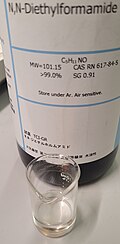Chemistry:Diethylformamide
From HandWiki

| |||
|
| |||

| |||
| Names | |||
|---|---|---|---|
| Preferred IUPAC name
N,N-Diethylformamide[1] | |||
| Other names
Diethylformamide, DEF
| |||
| Identifiers | |||
3D model (JSmol)
|
|||
| ChemSpider | |||
| EC Number |
| ||
PubChem CID
|
|||
| UNII | |||
| |||
| |||
| Properties | |||
| C5H11NO | |||
| Molar mass | 101.149 g·mol−1 | ||
| Appearance | colorless liquid | ||
| Boiling point | 176–177 °C (349–351 °F; 449–450 K)[2] | ||
Except where otherwise noted, data are given for materials in their standard state (at 25 °C [77 °F], 100 kPa). | |||
| Infobox references | |||
Tracking categories (test):
Diethylformamide is an organic compound with the formula C5H11NO.[3] As its name indicates, it is structurally related to formamide, having two ethyl groups in place of the two hydrogens. It is used in place of the related dimethylformamide for niche applications.
Preparation
Diethylformamide may be prepared industrially by combining diethylamine and methyl formate at atmospheric pressure.[4]
Applications
Diethylformamide is used as a solvent in the production of metal–organic frameworks to be used for gas storage.[5]
References
- ↑ Nomenclature of Organic Chemistry : IUPAC Recommendations and Preferred Names 2013 (Blue Book). Cambridge: The Royal Society of Chemistry. 2014. pp. 841, 844. doi:10.1039/9781849733069-FP001. ISBN 978-0-85404-182-4. "The traditional name ‘formamide’ is retained for HCO-NH2 and is the preferred IUPAC name. Substitution is permitted on the –NH2 group."
- ↑ "N,N-Diethylformamide". https://www.sigmaaldrich.com/US/en/product/aldrich/186317.
- ↑ PubChem. "N,N-Diethylformamide" (in en). https://pubchem.ncbi.nlm.nih.gov/compound/N_N-Diethylformamide.
- ↑ 王传良, "Preparation method of N,-N-diethyl-formamide", CN patent application 103012183A, published 2013-04-03
- ↑ Dincă, Mircea; Long, Jeffrey R. (2008). "Hydrogen Storage in Microporous Metal–Organic Frameworks with Exposed Metal Sites". Angewandte Chemie International Edition 47 (36): 6766–6779. doi:10.1002/anie.200801163.
 |



